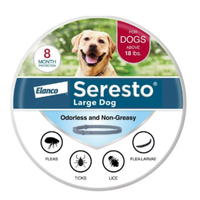How long do dogs live? We checked with a vet
How long do dogs live is a question on many pet parents' minds. We spoke to a vet to find out the answer.

How long do dogs live may be one of the questions you ask yourself before getting a dog and you wouldn't be alone. As pet parents, it is our job to give our pups the best life possible to keep them happy, healthy, and around for as long as possible.
But unfortunately, even with doing everything like providing the best dog food and ensuring your pup gets plenty of exercise, our pooches won't live forever. So if you're in the market you may want to consider which breeds live the longest. Or if you already have a dog, you may want to know a few things you can do to extend their lives.
We spoke to vet, Dr. Hannah Godfrey to find out how long dogs live, which breeds live the longest, and what we can do to give our pups happy and healthy lives.
How long do dogs live?

Of course, we all want our pups to live forever, and thinking of them passing away is hard but it is good to have an idea of just how long dogs generally live. Generally, smaller breeds such as terriers tend to live longer than larger ones, according to Dr. Hannah Godfrey. Larger dogs would be breeds such as Great Danes and St. Bernards.
She says, "The average lifespan for a small breed dog would be around 13 to 16 years, although many live longer. On the other hand, giant breeds may live around 7 to 10 years, and medium and large breeds lie somewhere in the middle."
Which breeds live the longest?

Small breeds tend to live longer than most other breeds. So if you've got a Chihuahua, you can rest easy knowing your pooch will be around for years and years to come. Similar breeds in the terrier family are said to live for 13-16 years. Dr. Godfrey notes that some have even made it to 20 years and more!
On the other hand, larger breeds generally have a lifespan between seven to 12 years. Giant breeds like Newfoundlands don’t live as long, around 7 to 10 years. Which is just one thing to know about taking care of large-breed dogs.
PetsRadar Newsletter
Get the best advice, tips and top tech for your beloved Pets
Popular large breeds like Labradors and Golden Retrievers have an average lifespan of 10 to 12 years, although as with any breed, some dogs live longer.
We also rounded up a full list of dog breeds that live the longest for you.
Common causes of death and how to avoid it
While there are many things that can affect a dog's longevity, there are some things we should pay particular attention to. "Owners should be proactive at protecting their dog's health, this includes guarding their dog against infectious diseases. Some potentially fatal viruses like parvovirus, leptospirosis, rabies, and distemper are thankfully preventable through vaccinations. We can also reduce our dog’s likelihood of getting serious tick-borne diseases through regular anti-parasite treatment."
This is where having one of the best flea collars for dogs can also come in handy.
Other causes of early death in dogs include serious trauma accidents, Dr. Godfrey says. Things like traffic accidents or falling from a high height. She also notes that dogs who are obese are at high-risk. "In my experience, dogs that are obese are more likely to die prematurely through cancer, heart disease, and diabetes, or may have to be euthanized due to painful, degenerative joint disease."
Helping our dogs stay active and at a healthy body weight is the best protection as they age.
Seresto Flea & Tick Collar for Dogs
This collar has a long-lasting formula that protects dogs and puppies from fleas and ticks for up to eight months. It starts working within 24 hours to offer fast relief to your pooch.
How to help dogs live a long and healthy life

Luckily, there are many things we can do to help our dogs live happy and healthy lives. Dr. Godrey says, "While breed and genetics will have an impact on your dog’s life expectancy, you can help them live a long and healthy life by keeping them active and at a healthy weight, treating them for parasites regularly, brushing their teeth, and ensuring they receive their annual vaccination and health checkup with the vet."
1. Regular exercise
There are endless ways to workout with your pet, so why not include your pup in your next walk, gym session or yoga class? Keeping them moving will help your dog maintain a healthy weight for their breed.
2. Nutritious diet
You want to make sure that you are feeding your dog a nutritious diet, filled with all the protein, vitamins, and minerals they need. While there are many surprising things dogs can eat, you will want to ensure that their main diet consists of dog food.
3. Practice dental hygiene
While it may be a pain, brushing your dog's teeth is important to ward off dental diseases. If you want to know how to brush a dog's teeth check out our vet's guide to guide you every step of the way.
4. Regular vet visits
Lastly, it is very important to keep up with regular vet check-ups and annual vaccinations. We recommend investing in some of the best pet insurance to help offset these costs and cover you in case of any emergencies.
Vet's Best Enzymatic Toothpaste, 3.5-oz bottle + Fingerbrush Dog Toothbrush
Enzymatic gel toothpaste in a easy-to-squeeze to squeeze tube will keep your pup's teeth clean and healthy.

If you found this feature helpful, why not check out A vet's guide to dog exercise?

Dr. Hannah Godfrey is a small animal vet who graduated from the Royal Veterinary College in 2011 and began work straight away at a busy mixed practice. Initially, she treated all species, but focussed on small animals from 2014. She has a passion for soft tissue surgery, ultrasound, and canine and feline dentistry, having completed additional training in these areas.

Alexis is a Digital and Syndication writer for PetsRadar and she produces everything from our listicles to buying guides, features, and deals. Growing up with cats, dogs, and fish, Alexis brings her own personal experience and knowledge to the content she writes.
Originally from the United States, Alexis graduated from Bowling Green University with a Bachelor of Arts degree with a concentration in English Language and Literature. She began her editorial career working as in Editorial Intern at Ohio Magazine and fell in love with lifestyle journalism.
Alexis has also worked for titles across the UK including Daily Mail, Space.com, and Black Women Rising Magazine.
Alexis works hand-in-hand with qualified vets to bring accurate and helpful information to pet parents and is passionate about creating content that will not only support pet parents but also offer them an enjoyable read.


